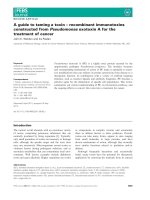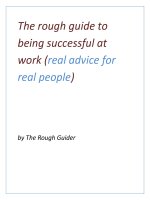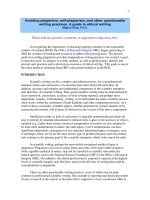Vietnam Today A Guide to a Nation at a Crossroads
Bạn đang xem bản rút gọn của tài liệu. Xem và tải ngay bản đầy đủ của tài liệu tại đây (1013.53 KB, 217 trang )
Vietnam Today
A Guide to a Nation
at a Crossroads
More early praise for Mark Ashwill and Vietnam Today
“Vietnam Today provides constructive advice to those who wish to build
lasting relationships with their Vietnamese counterparts. Most importantly,
Vietnam Today helps the reader understand enduring aspects of traditional
culture in the context of a country undergoing profound and rapid change.”
—Patti McGill Peterson, Executive Director,
International Exchange of Scholars
“Mark Ashwill has provided us with a primer that will help Americans
and the world community understand the people, the culture, the history
and the spirit of the Vietnamese. This is an important step in helping us
understand an emerging country in the world community.”
—Stephen T. Banko III, Vietnam War Veteran
“At last, an introduction to Vietnam that is about a country rather than a
war. Ashwill and Diep have built a cultural bridge you will want to cross.”
—Dr. Allan E. Goodman, President and CEO,
Institute of International Education
“Vietnam Today is a very balanced primer of history, culture and psychol-
ogy. A must-read for anyone planning a business trip to Vietnam.”
—P. Joseph Koessler, Former Strategic Marketing Manager,
Coca-Cola Southeast and West Asia Division
“With great interest, I read your book from cover to cover. I cried, I
laughed, I smiled, my eyes full of silent tears as I read what you wrote. For
the first time, I don’t get annoyed with a ‘foreigner’ talking about my
country and my people.”
—Nguyen Phuong Mai, reporter,
Sinh Vien Viet Nam (Vietnam Student News)
Mark A. Ashwill
with THAI NGOC DIEP
Vietnam Today
A Guide to a Nation
at a Crossroads
First published by Intercultural Press, a Nicholas Brealey Publishing Company, in 2005
Intercultural Press, Inc. Nicholas Brealey Publishing
A Nicholas Brealey Publishing Company 3-5 Spafield Street, Clerkenwell
PO Box 700 London, EC1R 4QB, UK
Yarmouth, Maine 04096 USA
Tel: 207-846-5168 Tel: +44-(0)-207-239-0360
Fax: 207-846-5181 Fax: +44-(0)-207-239-0370
www.interculturalpress.com www.nbrealey-books.com
© Copyright 2005 by Mark A. Ashwill
All rights reserved. No part of this publication may be reproduced in any manner whatsoever
without written permission from the publisher, except in the case of brief quotations embodied in
critical articles or reviews.
Printed in the United States of America
0908070605 12345
ISBN: 1-931930-09-0
Library of Congress Cataloging-in-Publication Data
Ashwill, Mark A.
Vietnam today : a guide to a nation at a crossroads / Mark A. Ashwill with Thai Ngoc Diep.—
1st. ed.
p. cm.
Includes bibliographical references.
ISBN 1-931930-09-0 (alk. paper)
1. Vietnam. 2. Business etiquette—Vietnam. I. Thai, Ngoc Diep, 1975– II. Title.
DS556.3.A74 2004
959.704'4—dc22
2004023585
Dedicated to those Vietnamese and foreigners who serve as
bridges between their respective cultures and who work
together in the name of peace, prosperity, and friendship
A thousand years of Chinese rule,
A hundred years of French subjugation,
And ten years of American domination,
But we survived, unified.
—Vietnamese saying
The CIA World Factbook 2004
Contents
Acknowledgments xi
To the Reader xv
Introduction xix
CHAPTER
1 Nation at a Crossroads 1
CHAPTER
2 Country Overview 9
Geography 9
People 11
Politics and Administration 15
Economy 18
Business Environment 19
Overseas Vietnamese 22
Tourism 22
Business Centers 23
CHAPTER
3 A Brief History 27
History and Vietnam’s “National Personality” 28
Chinese Rule 29
French Subjugation 33
Vietnam in the Post–World War II Era 36
American Domination 38
They Called It Peace 40
Forgiven and Forgotten? 42
After 1975 45
CHAPTER
4 Vietnam at Peace 51
Economic Reforms 55
Corruption and Bureaucracy 58
Education and Training 61
Regional Differences 71
Male–Female Relationships 73
Looking Ahead 77
CHAPTER
5 Core Cultural Dimensions 79
Community and Collectivism 79
Indirect Communication 82
Nonverbal Communication 88
Other Cultural Dimensions Related to Harmony 91
Vietnamese Cultural Categories 94
CHAPTER
6 Working with the Vietnamese 99
Prerequisites for a Successful Working Relationship 99
Your Mindset 102
Relationship Building 103
The Initial Business Appointment 107
Negotiating 117
Socializing and Gift Giving 119
Contracts 121
Ten Principles for Working in Vietnam 123
CHAPTER
7 How the Vietnamese See Westerners 129
Initial Impressions and Experiences 130
Likes and Dislikes 132
Common Problems 137
Success Stories 140
Cultural Misunderstandings 144
CHAPTER
8 Epilogue 153
Market Economy with a Socialist Orientation 153
Access to Information 154
The Future 155
viii Contents
Implications for Westerners 157
Some Final Words of Advice 160
Appendixes 163
A. Vietnam: A Statistical Profile 163
B. Historical Highlights 167
C. Recommended Websites 171
References and Recommended Readings 179
Index 183
Contents ix
Acknowledgments
I owe a debt of gratitude to my collaborator and junior partner, Thai
Ngoc Diep, who assisted me with Vietnam Today. (See her biographical
sketch in “To the Reader.”) Without her this project would not have come
to fruition. My heartfelt thanks also go to Judy Carl-Hendrick, managing
editor of Intercultural Press, for working her magic, and to Patricia
O’Hare, publisher of Intercultural Press, for her support.
I wish to acknowledge the contribution of Lady Borton, whom I met
for the first time last year in Hanoi. Like the Vietnamese among whom
she lives, Lady (her real name) is a modest woman who would no doubt
blush at hearing me say that she is something of a living legend in Viet-
nam. (It has been said that she is a Vietnamese disguised as a U.S. Ameri-
can, high praise indeed.) She came to Quang Ngai province to work in a
Quaker Service rehabilitation center for civilian amputees from 1969 to
1971. Since then, she has devoted much of her career and life to Vietnam.
Lady is the country representative for the American Friends Service Com-
mittee (Quaker Service) in Hanoi.
Lady’s unpublished essay, “To Be Sure ...:Work Practices in Viet
Nam,” parts of which I have used and cited in Vietnam Today and which I
list as a recommended reading, contains information about cultural
dimensions, work practices, and relationship building, as well as prin-
ciples for working in Vietnam. Much of the analysis and advice contained
in this widely circulated work, which is well known within the expat com-
munity and among foreigners who travel to Vietnam on a regular basis,
was affirmed by our Vietnamese and expatriate respondents. Lady is an
inspiration to me and many others, and a treasure trove of information
about Vietnamese culture and society.
It is with deep gratitude and joy that I acknowledge the many indi-
viduals and institutions in Vietnam and the United States that helped
make this book possible. They include the Council for International
Exchange of Scholars (CIES), which enabled me to work in 2003 as a
visiting scholar in Hanoi under the auspices of a Fulbright Senior Special-
ists Grant; United University Professions (UUP), for professional devel-
opment grants that allowed me to continue my Vietnam-related work;
the U.S.-Indochina Educational Foundation, Inc. (USIEF), the State Uni-
versity of New York at Buffalo (SUNY/Buffalo), and the many Viet-
namese nationals and expatriates from Australia, France, Germany, the
U.S., the UK, and other countries who set aside precious time to share
with us their knowledge, experience, wisdom and advice in the form of
completed surveys, interviews, e-mail exchanges, and telephone conver-
sations.
I am grateful to Le Minh Ngoc, Nguyen Phuong Mai, and Pham Thi
Hong Van, who read and commented on various drafts of Vietnam Today
with great care and insight. They gladly played the roles of sounding
board, cultural informant, and critic. I would also like to thank Pham
Minh Hang, who has been a steadfast source of support and inspiration.
There are unnamed others who contributed to this project in ways both
tangible and intangible. They, too, have my gratitude.
Thanks to Professor Huu Ngoc, a renowned Vietnamese writer, jour-
nalist, and translator, who was generous enough to spend some time with
me on a cool, rainy May morning in his office at The Gio Publishers in
Hanoi. A prolific writer and lecturer who has traveled extensively, Profes-
sor Ngoc has been described as a “span of the cultural bridge joining Viet-
nam to other cultures.”
Vietnam Today is, in some respects, a collective work. It contains the
advice, ideas, experiences and reflections of people far more experienced
than Thai Ngoc Diep or I. However, neither these individuals nor those
xii Acknowledgments
mentioned above can be held responsible for errors of omission or com-
mission that may be found herein. Any shortcomings in the substance
and content of this book are our sole responsibility.
Mark A. Ashwill
Buffalo, New York, USA
Hanoi, Vietnam
Acknowledgments xiii
To the Reader
In my personal and professional life, I have had the opportunity and priv-
ilege to become acquainted with two countries that shared the world
stage in the twentieth century and whose fates have been interwoven—
for better and for worse—with that of my country, the United States of
America. In one, the Federal Republic of Germany, the vanquished
became a cherished ally and key player in the postwar world order. In the
other, the Socialist Republic of Vietnam, the victor remained a hated
enemy, became an obsession, and insinuated itself into the national psy-
che, pervading the popular culture of the U.S. and forever transforming
that nation’s political discourse.
In Germany, I learned the language, studied, taught, and conducted
research. In Vietnam, I have developed programs for students and busi-
nesspeople, have worked under the auspices of a Fulbright Senior Special-
ists Grant, and have just begun to scratch the surface of a beautiful and
expressive language that has no fewer than six tones. Each visit has been a
profound learning experience and an inspiration to delve ever deeper
into Vietnamese culture, to learn from others far more experienced and
knowledgeable than I, and to share that information and knowledge
through articles, conversations, lectures, workshops, and now Vietnam
Today: A Guide to a Nation at a Crossroads.
I vividly recall my first trip to Vietnam in January 1996. Looking at
the coastline, jungle, and rice paddies below, I thought of the grisly tele-
vised images I had come to know as a child growing up in the 1960s. As
someone who came of age as the war was winding down, I rejoiced at the
prospect of visiting a Vietnam at peace. With each return visit, including
several in 2003 and 2004, this sense of excitement, joy, and hope has yet to
lose any of its initial intensity.
Thai Ngoc Diep assisted me in researching Vietnam Today. Thai was
born in 1975, the year the war ended and Vietnam was reunited. She
received her B.A. in International Business from the Hanoi Foreign Trade
University and her M.A. in International Business and World Trade from
the State University of New York at Buffalo. Before pursuing graduate
study in the United States, Thai worked for the Hanoi offices of the U.S.-
Vietnam Trade Council, an American nonprofit organization dedicated
to promoting trade between the U.S. and Vietnam, and for Ericcson, a
Swedish company that is one of the world’s leading manufacturers of
consumer communications and data products.
Thai’s perspective is that of a bilingual and bicultural Vietnamese
woman who has had extensive experience with U.S. Americans and other
Westerners in business and academic settings. This includes individuals
who were unsuccessful because they tried in vain to make the Vietnamese
fit into their narrow cultural framework, as well as others who listened,
watched, and learned how to negotiate their way successfully through
Vietnamese culture, learning from both negative and positive role mod-
els. Thai and other members of the postwar generation grew up in a time
of deprivation and uncertainty, but also of hope, optimism, and increas-
ing material well-being. Witnesses to and participants in a transforma-
tion of historic proportions, they are the future of Vietnam.
Together, we bring a multitude of perspectives and experiences to
bear on the increasingly popular and practical subject of Vietnam as a
country. We are fortunate to be able to play a small role, mainly as aca-
demics, nonprofit workers, and “citizen diplomats,” in shaping the future
relationship of our countries. Our different and at times divergent per-
spectives have served as a system of checks and balances, making for a
richer and more in-depth survey of Vietnamese behavioral culture. In
some respects, writing this book has been a process of converting theory
into practice, especially as it relates to work and communication styles.
xvi To the Reader
Thai and I share a passionate desire to inform our readers about the
sources of misunderstanding between Vietnam, the U.S., and other West-
ern countries, and to explore and suggest ways in which these often siz-
able gaps can be bridged. For foreigners who have done their homework
and gauged their expectations to reality, Vietnam can be a land of oppor-
tunity. If you plan to travel to Vietnam, success is within reach if you
bring along the type of basic knowledge of Vietnamese culture that you
will find in Vietnam Today—as well as a long-term perspective, a schedule
and budget that allow for regular trips to Vietnam, and renewable
reserves of energy and perseverance.
The U.S. and Vietnam have a special relationship, born of bloodshed
and redeemed in peaceful, productive, and mutually beneficial interac-
tion. This is what President Bill Clinton meant during his historic
November 2000 visit to Vietnam when he spoke of how “the histories of
our two nations are deeply intertwined in ways that are both a source of
pain for generations that came before and a source of promise for genera-
tions yet to come.” This statement, as eloquent as it is accurate, resonates
on an intellectual, emotional, and spiritual level. Indeed, it is the perfect
embodiment of the spirit in which Vietnam Today is written.
As educators and practitioners, we owe it to you, our readers, to tell
you the truth not only about “Vietnam” as a war but also, more impor-
tant, about Vietnam as a dynamic, beautiful, and captivating country
that, for all of its problems, is at peace, without foreign occupation and
with a promising future. Working in Vietnam can be an exhilarating
experience that will test your mettle and, at times, push you to the limit.
But if you are sufficiently well prepared, have a temperament that
embraces flexibility and patience, and are willing to adopt a long-term
view of the concept of “return on investment”—whatever that invest-
ment may be—then your chances of success will increase considerably.
Mark A. Ashwill
Buffalo, New York, USA
Hanoi, Vietnam
To the Reader xvii









